About 2.6 percent of American adults -- nearly 6 million people -- have bipolar disorder, according to the National Institute of Mental Health (NIMH). But the disease, characterized by significant and severe mood changes, is still dangerously misunderstood.
Bipolar disorder is vastly different from the normal ups and downs of everyday life, but many have co-opted the term to refer to any old change in thoughts or feelings. The mood swings in someone with bipolar disorder, sometimes also called manic depression, can damage relationships and hurt job performance. It has been estimated that anywhere from 25 to 50 percent of people with bipolar disorder attempt suicide at least once.
Artist Ellen Forney detailed her diagnosis with bipolar disorder in the graphic memoir Marbles: Mania, Depression, Michelangelo, and Me. Forney previously shared her story with us, specifically detailing how her bipolar disorder has affected her creative work.
Below are some poignant pages from the memoir, along with unique commentary into how these panels came to be and what they mean to Forney, in her own words.
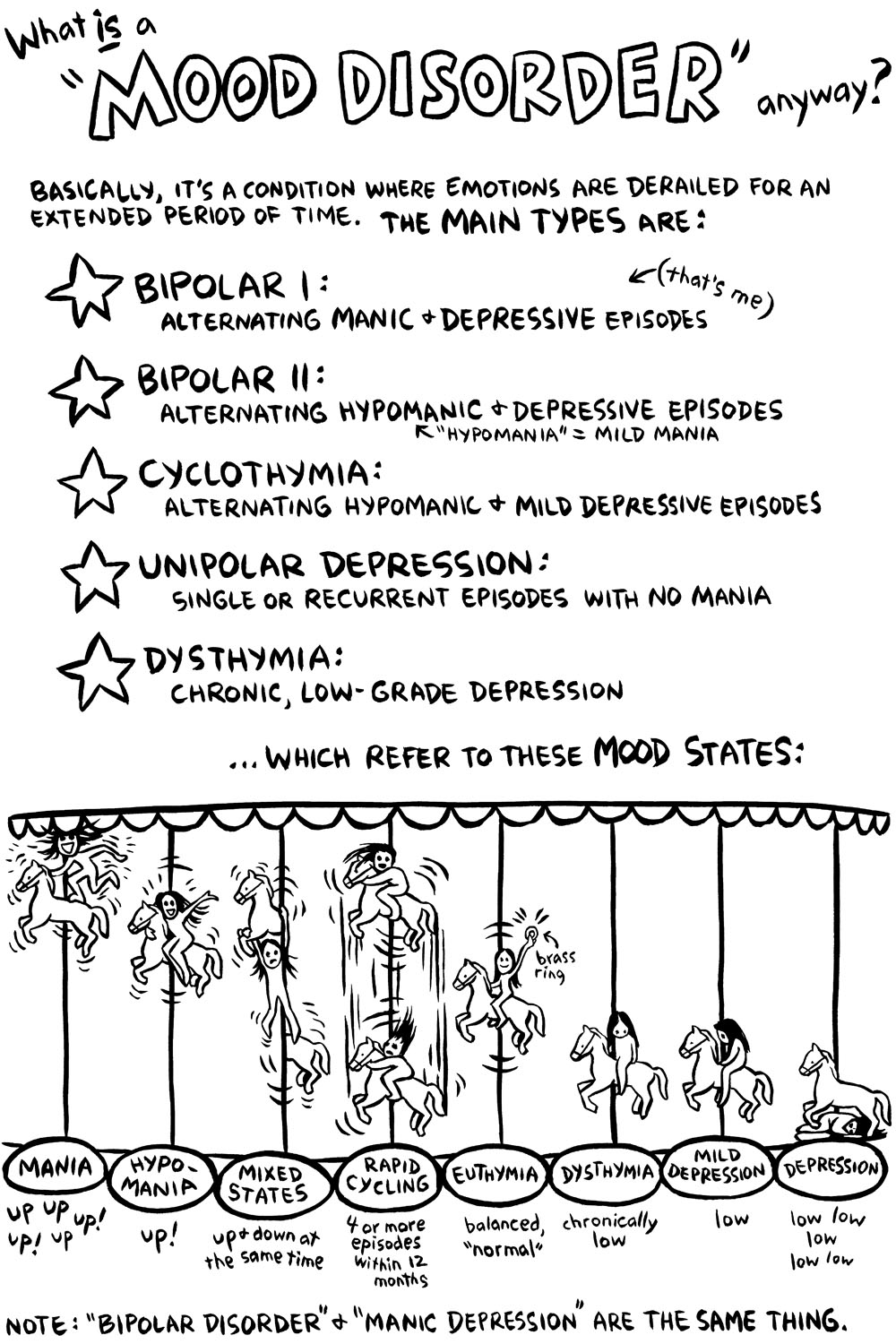
"I've heard from a lot of readers that the carousel metaphor has really clarified the different mood states for them. It's really satisfying when you're trying to explain something, and a metaphor that makes sense to you also works for someone else. I was originally going to draw a swing -- you know, "mood swings" -- but side-to-side didn't work, I needed up-and-down."
***
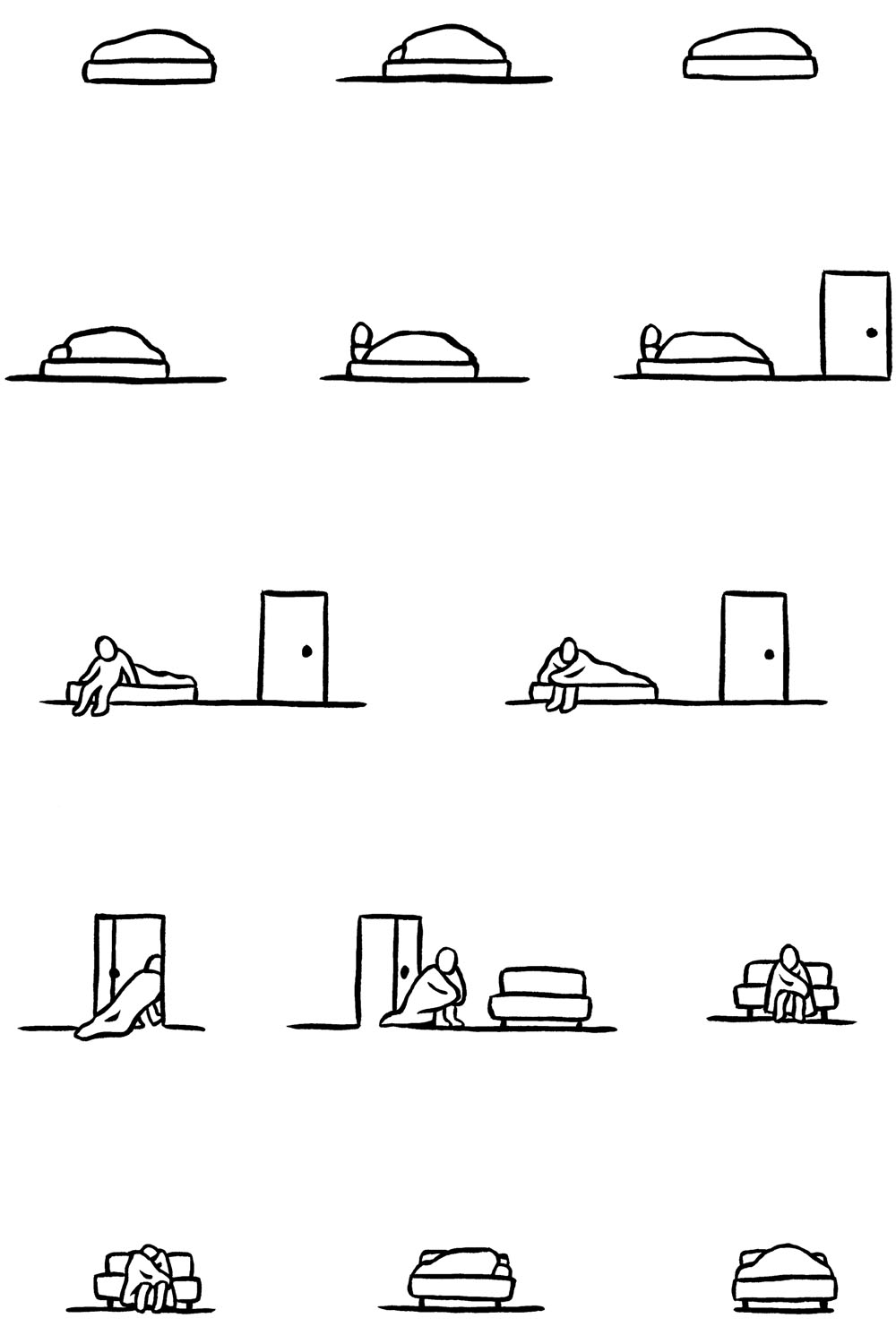
"A lot of readers have pointed to this page as one they identify with personally. I drew the scene very simply because I wanted it to not be set in time, or even space -- it wasn't what my bed looked like, or my couch, it was just a bed and a couch. It doesn't even depict me, specifically, it's mostly about the feeling of weariness and dread, with a tiny, sad bit of hope despite the feeling that all is futile. I do think this scene of having trouble getting out of bed is a common experience on the surface though, too."
***
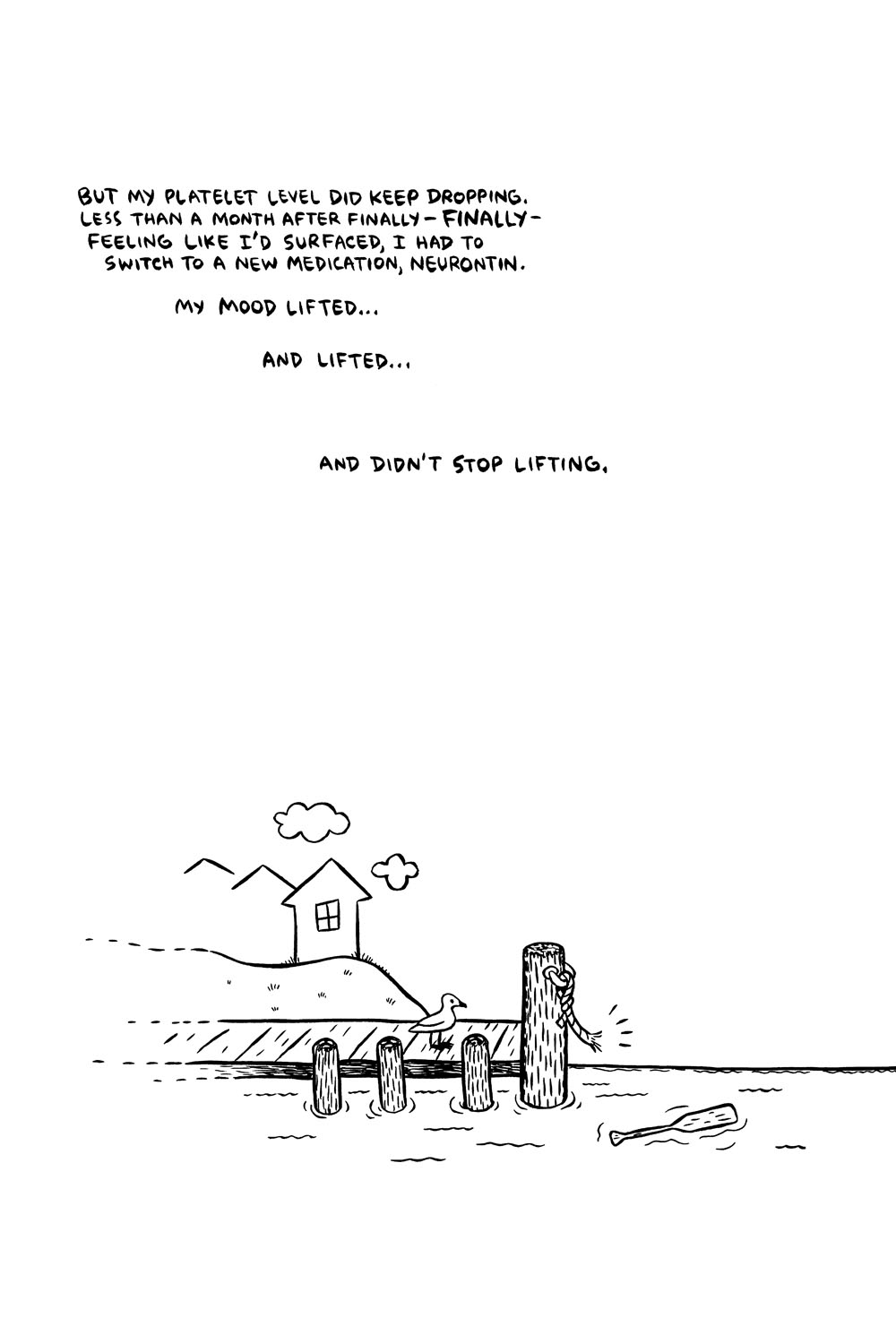
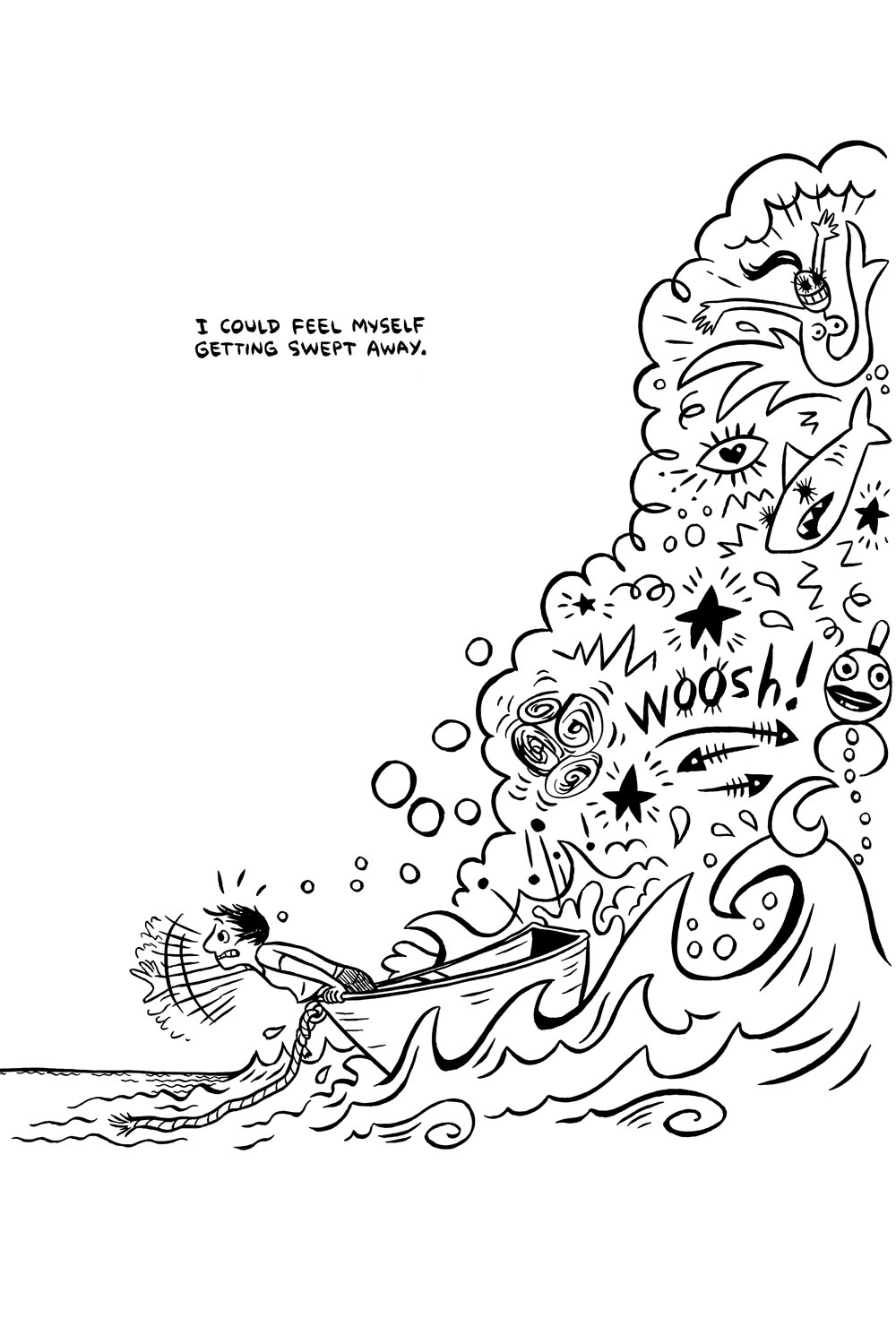
"It was really satisfying to draw that, to pin it down on paper like a butterfly and examine it; to externalize things that are so confusing if they stay inside. I don't know if it's because I'm a swimmer or because I just love the water, but I actually pictured that specifically, that I was feeling "unmoored." I suppose it's the flip side of depression's feeling like drowning.
You can see in that cloud that mania isn't all euphoric or happy, it's mostly that everything is punched up. I'm getting swept into that state of mind -- the cloud is a thought balloon."
***
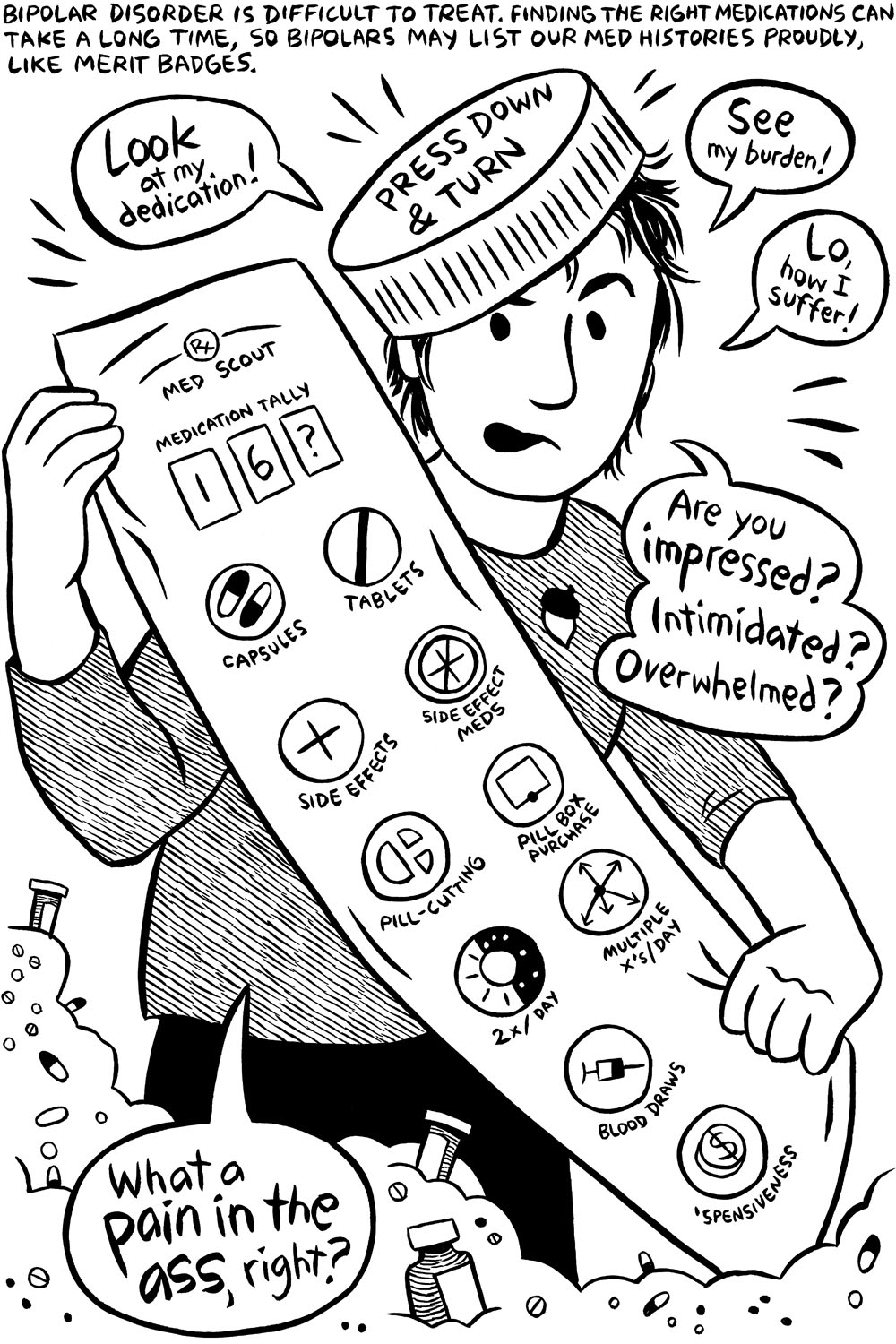
"What meds work or don't work for any one person is just so hit-or-miss right now. I remember a bipolar friend telling me with a certain backhanded pride that she'd been put on so many meds that she had a whole drawer full of bottles. I wanted to make the most of the absurdity of our victim-pride, so I imagined something like a Benny Hill soundtrack, and just rattled off my failed meds in cartoony, fast-moving panels. The merit badges were both serious -- because this is hard, and we deserve some kind of Purple Hearts -- and a nod to victim one-upmanship ("How many meds have you been on?" i.e., what are your battle scars?). In my head, this series of pages was really cinematic, like an old silent movie with slapstick in fast motion and tinkly music. That's the kind of energy I was going after."
***
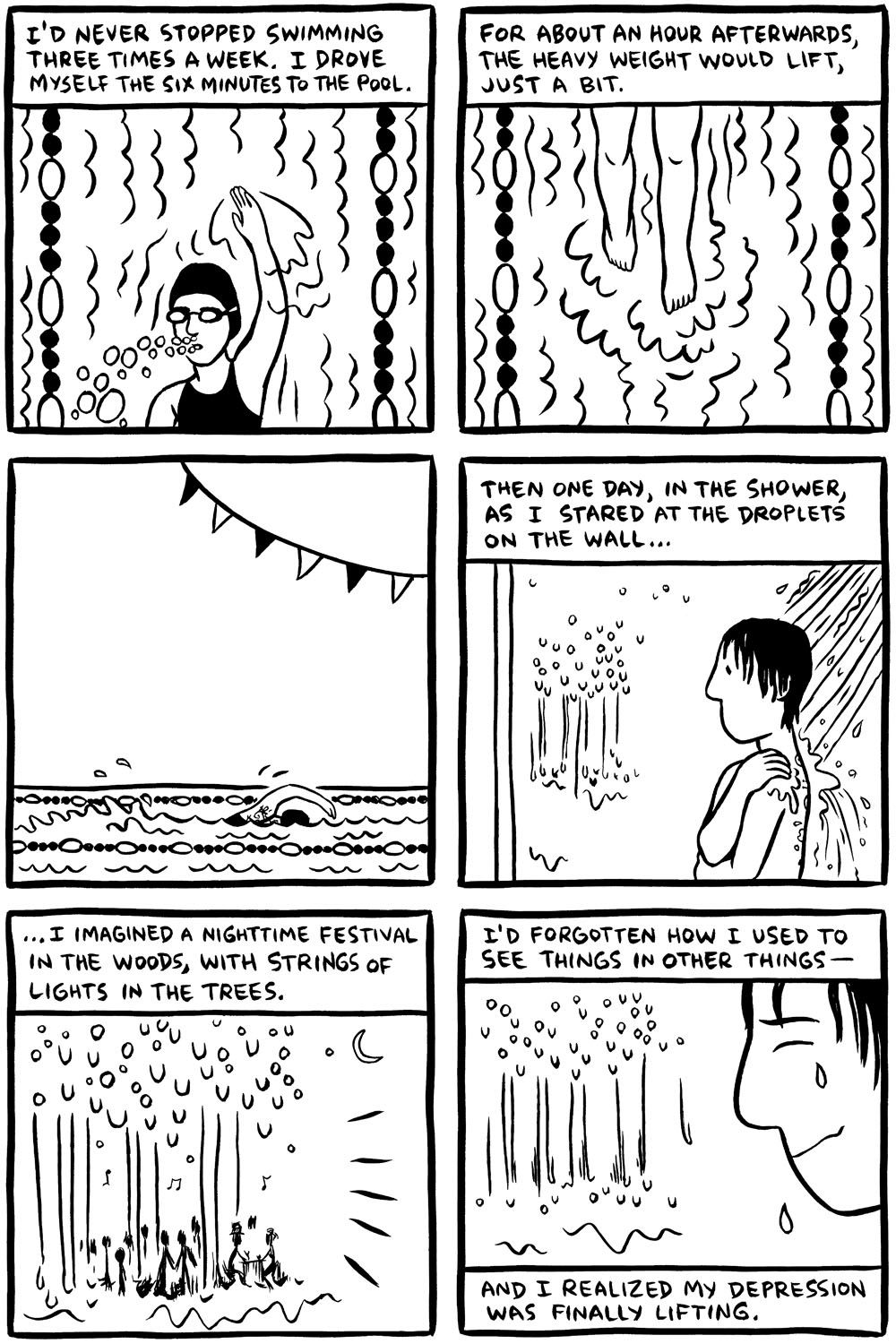
"This is one of my favorite pages. I've been a swimmer my whole life; with this page, I can just smell the chlorine, which is a comforting smell to me. I so clearly remember leaning my head against the cool side of the shower and crying and feeling like a weight had lifted. I finally had a sign that things were going to be okay. This page is like a cool drink of water to me -- it's not that the drink makes everything better, because the reason it feels so amazing is because you felt like you were dying of thirst. It's a resetting."
***
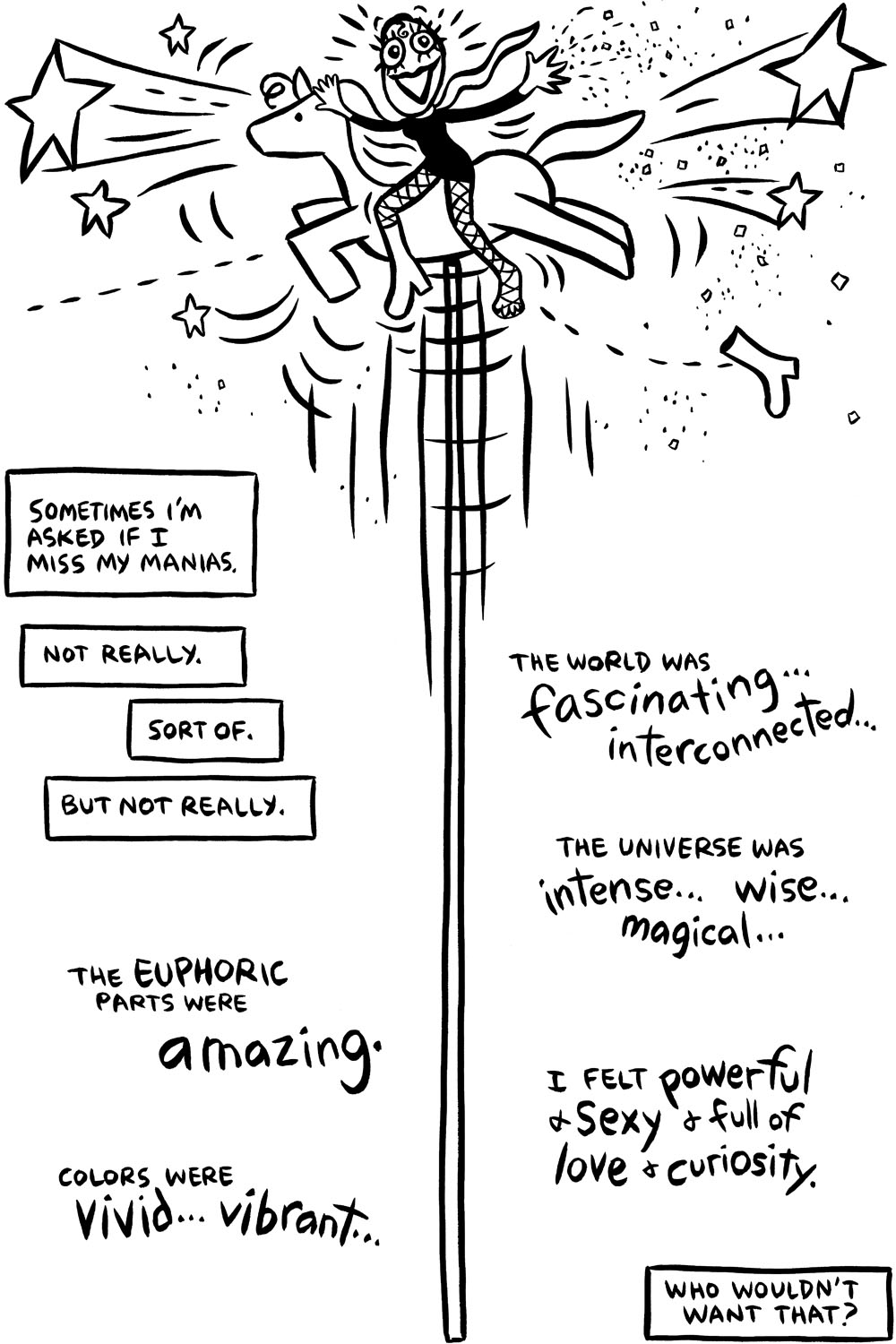
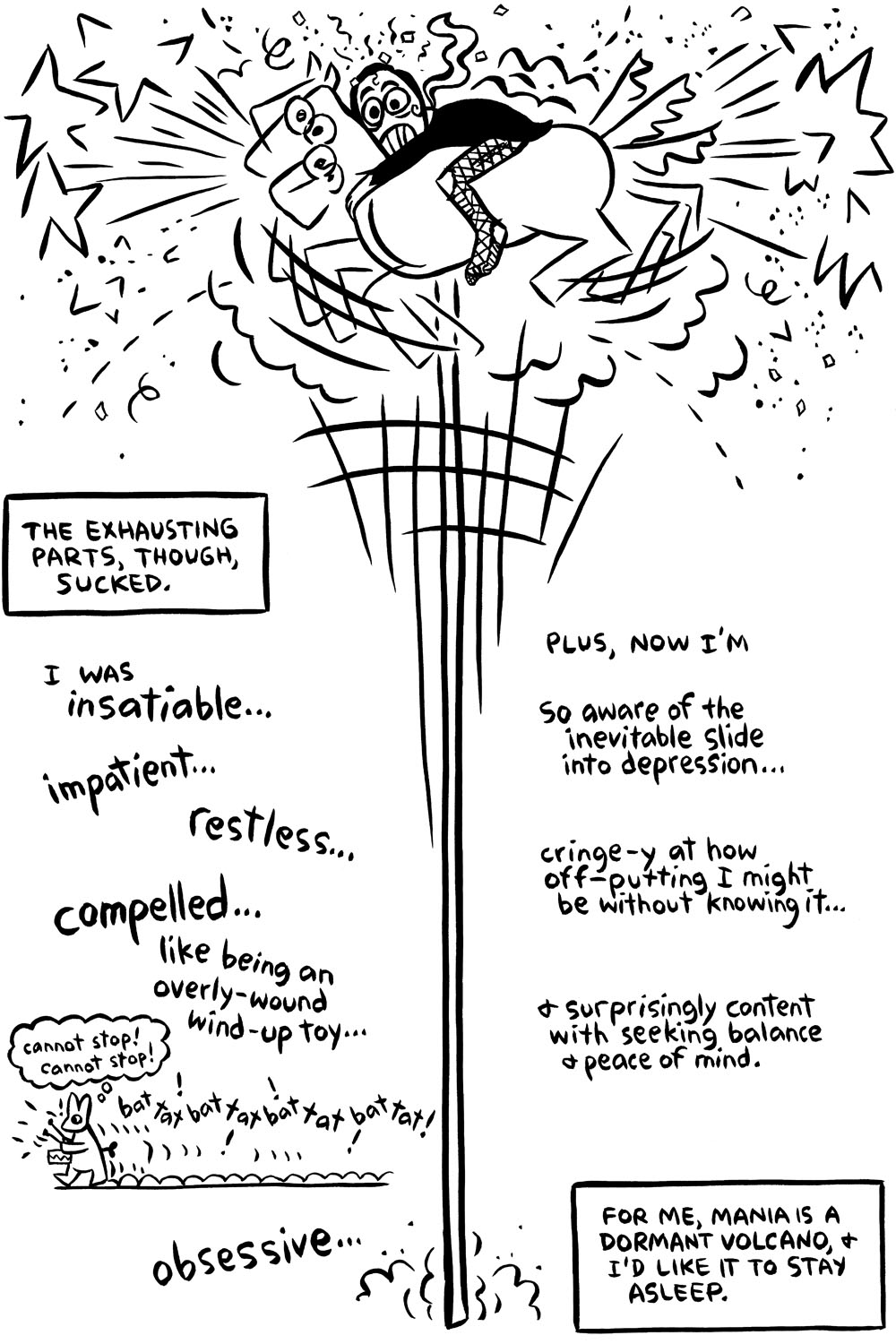
"It was satisfying to wrestle something unwieldy like mania into categories and tidy descriptions. I was also hoping to remind other bipolars who miss their manias -- especially if they're tempted to go off their meds -- that mania can be terrible, too. It's hard to describe, and my impression is that there's a lot of misunderstanding of what mania is."
***
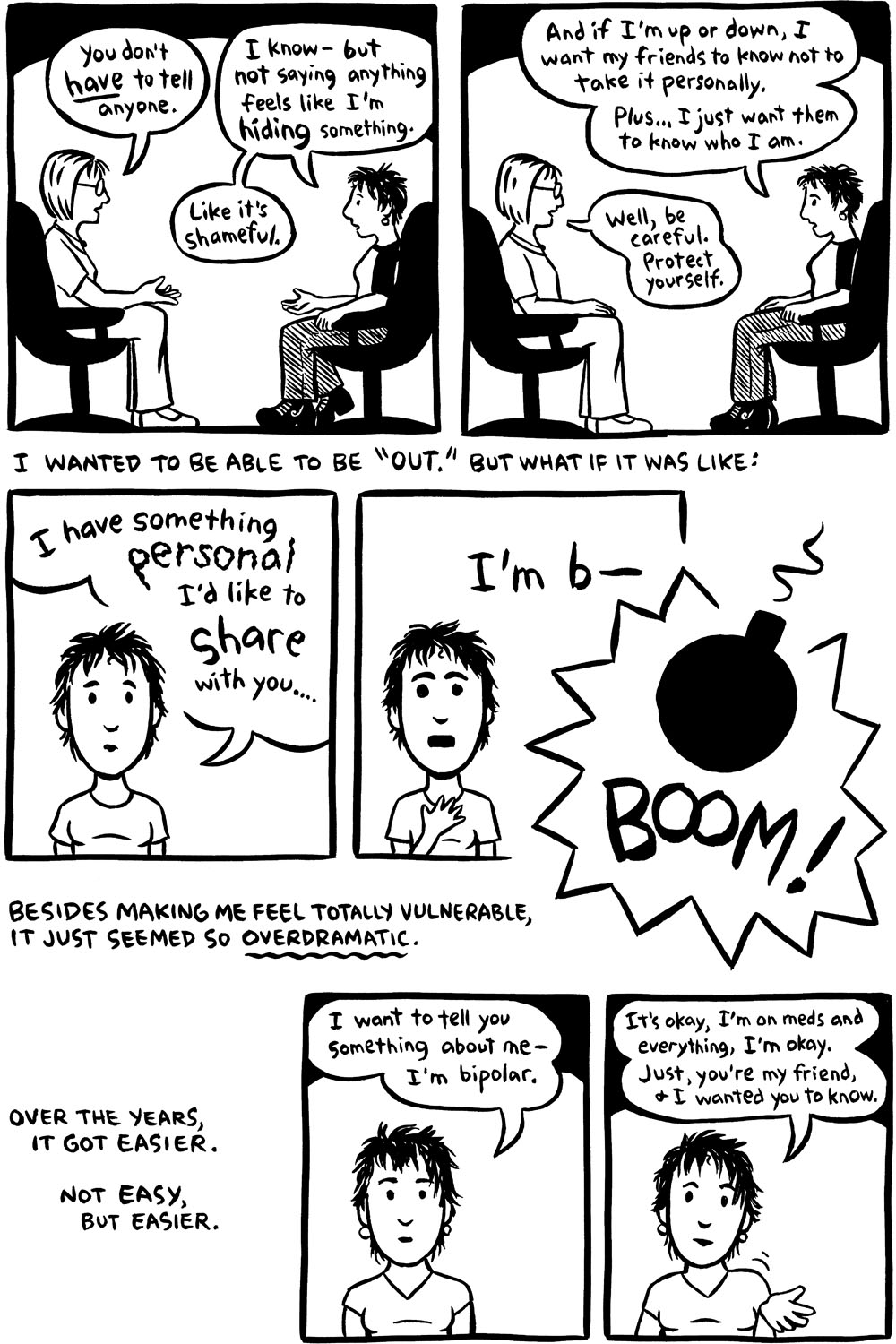
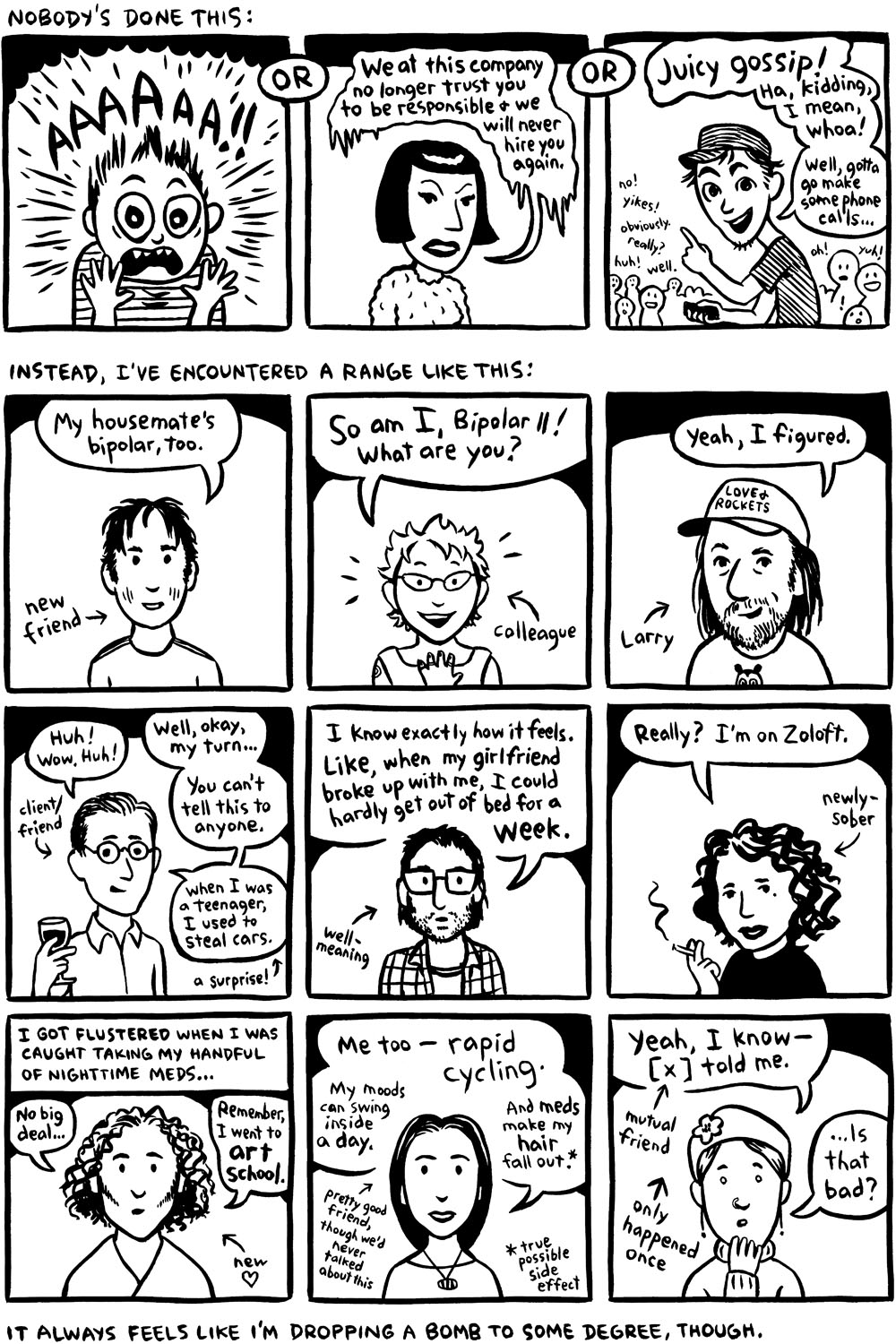
"Telling people is hard. But so many people have mental disorders. We have so much company. I wish I could tell everyone that it'd be okay to talk to other people about their illness. In my experience, more often than not, they will share their own personal experience -- if not for that person, then their friend or family member. I'm serious: more often than not. Who knew? It's something I'm privileged now to know, after coming out and talking about my bipolar disorder so openly because of Marbles.
A lot of people came out after Robin Williams's death, and in general there's a lot more awareness about mental illness, but for the most part people still don't feel safe talking abut their personal experiences. I think that the more people come out, the more the stigma will lift, but it's not easy. I will say for myself, though, that coming out has made me feel infinitely stronger and more resilient.
People sometimes ask me what they might do for a friend of theirs who is either manic or depressed or otherwise having a tough time and is kind of unreachable. My mom played a big role in keeping me afloat -- she made it clear that she loved me. Even in my haze of self-negation, there was some deep nut in me that knew she loved me, and I needed to carry on, if not for me then for her. My friends were patient and were there for me when I was ready. Sometimes that's about what you can do."
***
All image reprints courtesy of Gotham Books, an imprint of Penguin Random House.
Have a story about mental health that you'd like to share? Email strongertogether@huffingtonpost.com, or give us a call at (860) 348-3376, and you can record your story in your own words. Please be sure to include your name and phone number.
Need help? In the U.S., call 1-800-273-8255 for the National Suicide Prevention Lifeline.
